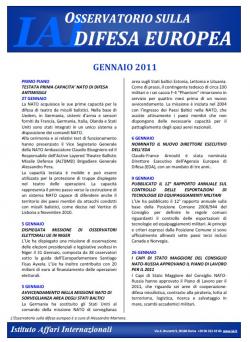Observatory on European defence, July-August 2007

1 July 2007
European Union - Portuguese Presidency: ESDP Programme
On 1 July, Portugal took over the Presidency of the European Union. The reference programme is the annual one presented together with Germany (1st semester 2007) and Slovenia (1st semester 2008) in January 2007. The Presidency confirmed some ESDP objectives of this 18-month programme, in order of priority:
- follow-up of the current missions and possible planning of new ones
- development of civil and military capabilities
- development of the strategic partnerships (NATO, UN and African Union).
To those, Portugal added as a specific priority for the semester cooperation with Africa and the Mediterranean area.
1 July 2007
NATO - Capabilities: Movement Coordination Centre Europe
The new centre for coordination of strategic transport, "Movement Coordination Centre Europe" (MCCE), at Eindhoven airbase (Netherlands) is now operational. The centre, which incorporates the NATO European Airlift Centre (EAC) and Sealift Coordination Centre (SCC), will coordinate the sea and air strategic transport during NATO and EU interventions, with an efficiency-based approach in using national assets.
11 July 2007
European Commission - Green Paper on bio-preparedness
The European Commission adopted a Green Paper on bio-preparedness. The document launches a process of consultation at European level involving public and private stakeholders in order to reduce biological risks and improve response capabilities in managing events that constitute a realistic threat aggravated by international terrorism.
Concerning the issues of bio-terrorism, the Istituto Affari Internazionali is involved in the "Bio-terrorism Resilience, Research, Reaction" (BIO3R) project funded by the DG Research of the European Commission in the framework of the "Preparatory Action in the field of Security Research" (PASR) 2006.
23-24 July 2007
General Affairs and External Relations Council - Darfur/Chad, Kosovo, Middle East
The Council examined the situation of crisis areas and reviewed ESDP missions.
The grave crisis in Darfur (Sudan) stands out, calling for the attention of the ministers: the EU civil and military support to the AMIS II mission of the African Union (AU) will continue for up to 6 months as of 1 July 2007 at the same time as deployment of the AU/UN hybrid force. The latter, named United Nations African Union Mission in Darfur (UNAMID), was authorized by UN Security Council Resolution 1769 of 31 July 2007. The mission will initially last 12 months and will involve - by January 2008 - near 20,000 men (including about 7,000 from AMIS II already on the spot and a police component of near 4,000 units).
The issue of the security of the countries and the populations close to the areas of crisis drove the Council to consider the possibility of an ESDP military operation in support of deployment of a multidimensional UN presence in eastern Chad and north-eastern Central African Republic. The mission is conditional on a UN Security Council resolution and should be conducted with the approval of the countries concerned and in close cooperation with UN and AU. During the summer, the procedure leading to the contingency planning started and the number of troops could reach 4,000 men, deployable as of next October.
The Council modified and extended to 30 November 2007 the mandate of the EU Planning team in Kosovo (EUPT Kosovo) which works on preparing the ESDP mission in the country, approved in 2006 - aimed at restoring the rule of law in the police, justice and customs sectors.
Finally, ministers underlined the need to re-launch the peace process in the Middle East. Regarding in particular the EU mission in the region, they confirmed the commitment to revive the activities of the EUPOL COPPS mission to support the Palestinian police, security reforms and the EU Border Assistance Mission of the Rafah crossing point (EU BAM Rafah) between Gaza and Egypt (suspended since 15 June). To that end, they urged the parties to provide the security conditions needed.
July/August 2007
NATO and EU - Civil Protection
The EU and NATO capabilities for civil protection coordination were activated to face the wave of forest fires which hit Europe during the summer. The NATO Euro-Atlantic Disaster Response Coordination Center" (EADRCC) dealt in particular with assistance requests from Bulgaria, Romania and Macedonia. Some NATO KFOR mission air assets also provided operations with support. The Monitoring and Information Centre (MIC) of the European Commission, coordinated aid for Greece, with the biggest rescue operation since the MIC was established in 2001, and received requests for assistance from Cyprus, Bulgaria and Macedonia.
24 August 2007
Lebanon - UNIFIL II Mission
The UN Security Council extended to 31 August 2008 the mandate of the UN Unifil II (United Nations Interim Force in Lebanon) mission. The mission, operating in the south since 1978, was reinforced by UN Resolution 1701 (2006) which ended the conflict between Israel and Hezbollah militias in July/August 2006. European countries contribute preponderantly with men and assets to the more then 11,000 UN troops committed: Italy commands the mission since February 2007.
-
Details
Roma, Istituto affari internazionali, 2007 -
Issue
07/07-08


